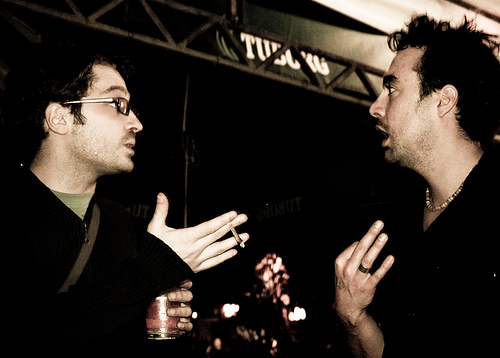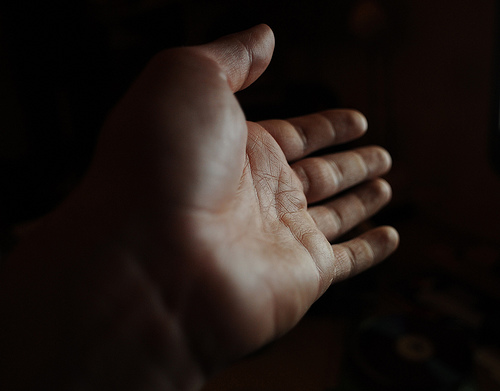Conflict. Anger. Offence.
They can kill our relationships and our families. Destroy our trust in each other and cause quite a lot of pain.
And so much of it can be prevented simply in how we listen to each other.
A while ago I was watching something and I saw out of the corner of my eye someone getting pretty “huffed” over something that was being said. I didn’t find the statement offensive in the least, but I could see the train of thought that made it sound offensive to the other person. It got me thinking.
How often are we hurt and offended or angered when we don’t need to be?
It seems to me that we can come to a conversation in two different ways: We can come to the conversation looking to be offended, or we can come looking to understand.
I love my Grandmother. She’s an amazing woman! She grew up during the depression in Idaho on a potato farm with three sisters and four brothers. She can tell you story after story about her childhood and her sisters, its like listening to a chapter out of Little Women. Today, at Ninety-Years-Old, she has only one surviving sibling left.
Anyway, sometimes as I’m listening to my grandmother talking about her ideas and opinions (and she has a lot of them) she’ll start saying things that sound, well, completely and totally racist.
Now my Grandmother has nothing against people of color. I wouldn’t consider her as racist at her heart. But her speech can sound pretty darn racist sometimes. No one ever taught her to not lump whole groups of people together and make blanket statements about them in exclusion of all others, so when she starts talking about poorer areas where gangs abound that are predominately black, she starts sounding pretty racist.
A person could easily take lots of offence and even have a right to when listening to my grandmother talk.
That doesn’t mean they need to, and if they do they might just cut themselves off from getting to know a really fascinating woman.
Examples abound in the news of people who said something in a negative way and are raked over the coals for it. Some meant what they said just as they said it, but some may simply haven’t been thinking about how what they said could possibly be interpreted.
But the question of sounding politically correct isn’t really what I want to dwell on in this post. What I want to talk about is how we listen to each other.
Have you even known a person, or even been a person, who always seems to only hear something offensive from people talking to you? Some people it can be really hard to talk to because you don’t know what you can say that they won’t be hurt by. They are always on the defensive, always ready for an attack. Many times people like this have deep rooted hurts for why they are reacting the way they react, and it can seem beyond their control. They may need even professional help to stop their behavior. But I think we can all be like this at times.
Maybe its just with one person who has done things to hurt us in the past, we start analyzing every statement they make for how they might be attacking us. It makes it impossible to relax and be ourselves around the person. It causes days of stress we never needed.
Or maybe its during times of stress that we can react like this. Something is going on in our lives, someone says something to us, and we just blow up royally.
We always think that we are justified in how we are feeling. We always think that it really is the other person at fault.
But is it?
Maybe what that person is saying is really meant to hurt us, but that doesn’t mean we need to take on that hurt.
But how can we not?
By listening to a persons heart more than their words.
Those painful barbs could be coming from a person that is extremely hurt themselves. Perhaps simply out of a reaction to pain. You’ve probably done the same to people yourself. If you take the time to see it, that understanding may just help you not take that barb to heart.
Or perhaps that comment that devastated you was made with the best intentions by someone who simply was clueless. We can recognize that they didn’t know better and forgive them for their naivety can’t we? We don’t need to be torn up with anger or bitterness by something that is no ones fault.
I’d like to be the kind of person who, when something is said that sounds horribly offensive, will look for any possibly meaning that could be taken as kindly meant, and choose to believe the person meant it that way instead. I’d probably be called horribly naïve, but I’d rather believe the best in people rather than the worst. Even if the worst is the true reality, for the health of my own heart I’d rather listen in grace than in offense.
But instead, so many times, the opposite becomes true for us, and myself. We will take a statement that was never meant to offend, and if their is any possible way we could hear it that would hurt us, we’ll choose to understand it in that way.
No wonder so many marriages are war zones. No wonder so much hurt crops up between us and those closest to us.
I’d rather hear things through a filter of forgiveness and understanding and grace.
But honestly? I’m so very guilty of being a listener for offense. Especially when listening to someone who has hurt me in the past.
And it does rob me. It robs me of joy, of peace of mind. It can drive me to the point where interacting with this person even in small ways creates tension and anxiety. But listening with grace can become the first step to reaching out to each other in healing.
I’d rather choose to be a listener in grace.
Do not repay anyone evil for evil. Be careful to do what is right in the eyes of everyone. If it is possible, as far as it depends on you, live at peace with everyone. Romans 12:17-18
~Joy Aletheia Stevens
Photo Credit: by Daniela Vladimirova (CC BY 2.0)
Photo Credit: by Geraint Otis Warlow (CC BY 2.0)
Photo Credit: by -5m (CC BY-SA 2.0)



Leave a Reply